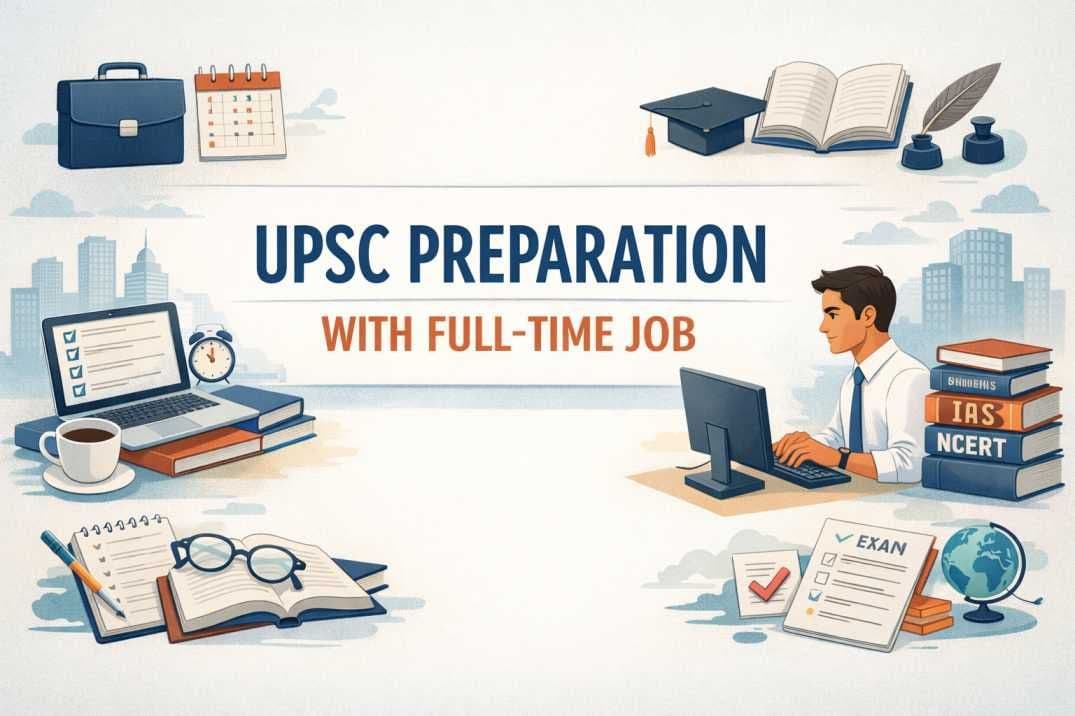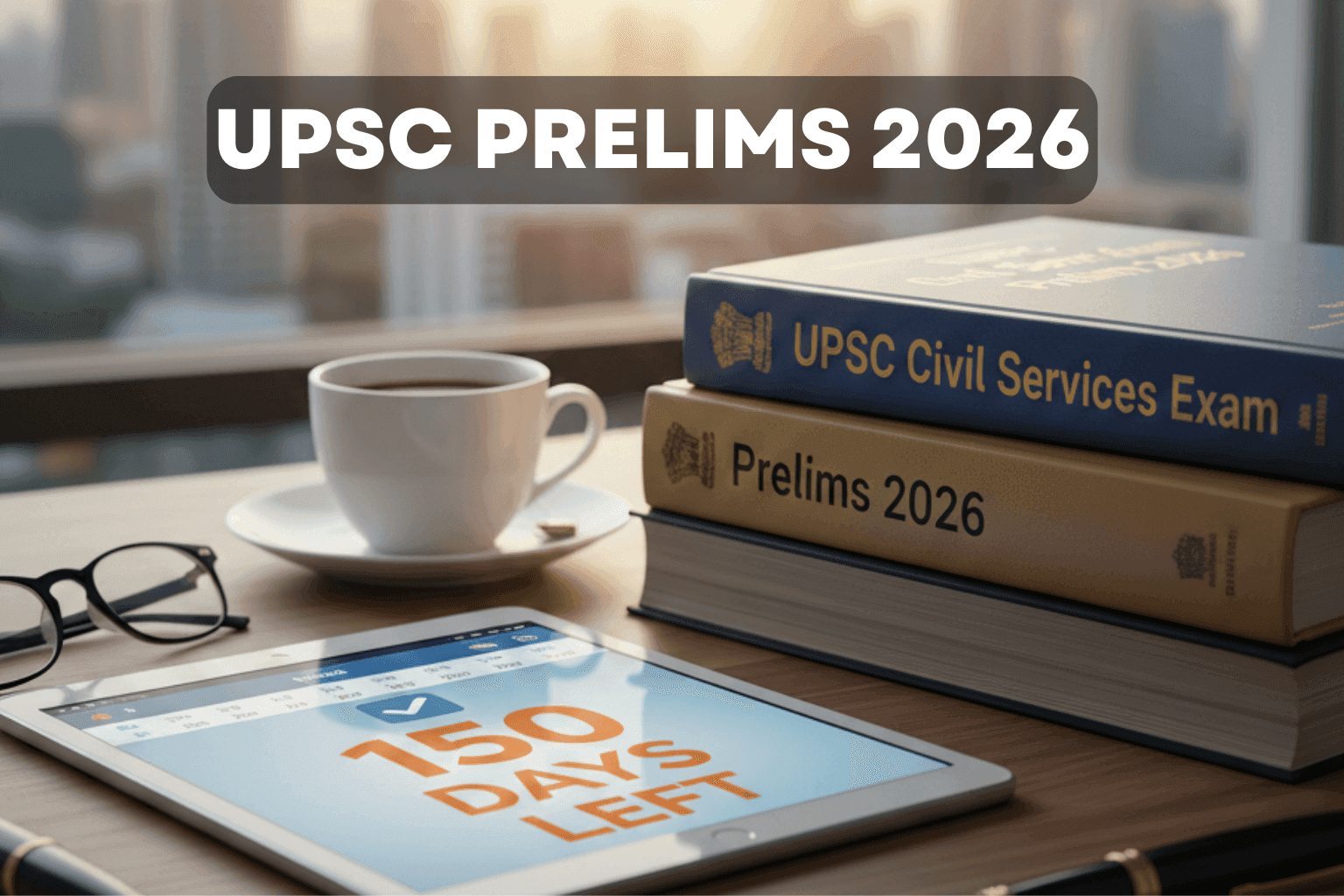UPSC Mains Syllabus 2025: Final Approach, Smarter Strategy & Revision
Jul, 2025
•5 min read
Now that you’ve clicked here, let me ask you one question from the heart: How are you feeling about the UPSC Mains syllabus preparation? Anxious? Unsure if you’re doing enough?
I get it. Mains 2025 is almost here. And that ticking clock can feel brutal. But take a deep breath. This is not the time to panic. You’ve come a long way, and now, it’s all about channeling that hard-earned momentum into this final stretch, with focus, care, and clarity.
As you already know, the first paper of UPSC Mains 2025 is scheduled for 22nd August, and over the five intense days, you’ll be writing nine papers that will test your mental endurance, discipline, and analytical approach.
Here, I’m not going to throw generic tips at you. Instead, we’ll understand what matters most right now, how to use your time wisely, and how to walk into the exam with confidence. Let this final push echo all your efforts!
UPSC Mains 2025 Paper-wise Strategy
No more experiments. It’s time for execution.
In the last few weeks, your focus must shift from scattered effort to targeted performance. You don’t need new resources; you need discipline, clarity, and refinement. Here’s how to approach each paper in the Mains syllabus like a serious aspirant who’s in it to clear the exam.
1. Essay Paper – Your Voice, Your Structure
UPSC wants clarity of thought, originality of perspective, and a structured approach. What to do now:
- Theme Bank: Build 3–5 solid themes (education, governance, ethics, individuality, change, etc.) with quotes, examples, and anecdotes.
- Structure Practice: Intro (story or quote) → Core arguments (multi-dimensional) → Counterview → Optimistic conclusion.
- Regular Practice: Write 1 essay every 4–5 days under exam conditions. Don’t just write—review your flow.
2. GS1 – Build Strong Concepts & Linkages
From historical movements to social change, your answers must feel integrated, not fragmented. Your focus areas now:
- Indian Society: Prepare examples for women, caste, urbanization, and secularism (use the Constitution and census data).
- Geography: Revise diagrams and maps (rivers, resources, disaster zones).
- History: Use timeline anchors and causes-effects structure.
- Art & Culture: revise PYQs & terms, don’t dive deep now.
1.5 hours a day on GS1 revision is enough to revise with mind maps.
3. GS2 – Precision & Policy-backed Answers
Quality here means facts, logic, and relevance. What works now:
- Use of reports & committees: ARC, Law Commission, NITI Aayog, SC judgments.
- Answer Writing: Practice writing answers using keywords like transparency, decentralization, federalism, and accountability.
- International Relations: Don’t go broad. Prepare current relations with major countries + India’s position in global groupings.
Practice intro–body–conclusion in points format with flow diagrams where possible.
4. GS3 – The Game-Changer, If you Prepare Right
If there’s one paper that reflects your grasp of India’s real-world challenges, it’s GS3. What you need to do:
- Economy: Focus on Budget 2024–25 themes, inclusive growth, agriculture schemes, MSP, inflation, and employment.
- Internal Security & Disaster Management: Prepare short frameworks and case studies.
- Environment & Tech: Learn current schemes (solar, EVs, AI, etc.). Practice integrating CA + static.
Keep facts ready from schemes, data from the economic survey, government portals, or PRS.
4. GS4 – Keep It Ethical, Think Like a Policy Maker
This is where you show your ethics, not just theory. What works:
- Revise from Notes: Use short, crisp definitions (e.g., integrity, objectivity, empathy).
- Answer Writing: Practice 10–15 case studies and revise the value-structure framework (stakeholders, ethical conflict, justification, outcome).
- Reflect Honesty: Be honest in your tone—don’t be robotic.
Use flowcharts and ethical matrices wherever possible to save time and stand out.
5. Optional Papers – Where Ranks Are Made
Your Optional holds the power to elevate your rank. Consistency > depth at this point. Must-do tasks now:
- Quick Revision: Revise core thinkers/concepts/models/theories through one-pagers.
- Revise Through PYQs: Focus on repeated themes from PYQs. Identify how questions are evolving.
- Mock Tests: Give 2 full-length tests per paper before Mains, with feedback.
- Present Well: Refine your presentation—handwriting, headings, depth, examples, flow, diagrams, and legibility.
If you’ve already revised once, now’s the time to build speed and structure.
6. Paper A & B – Language Papers: Don’t Take Them Lightly
Language papers may be qualifying, but they're compulsory, and failing here means all your effort goes to waste.
- Paper A (Indian Language):
- Practice writing formal letters, essays, and précis in your chosen language.
- Revise basic grammar, idioms, and comprehension formats.
- Make sure you’re familiar with the script if you don’t use it daily.
- Paper B (English):
- Practice one essay and one précis every week.
- Brush up on grammar, connectors, and sentence clarity.
- Read editorial pieces aloud to improve flow and articulation.
Reminder: These papers are easy to clear only if you prepare for them. Just 3–4 hours a week until the exam can ensure you never lose sleep over them.
Also read: UPSC Mains 2025: Proven Strategies to Boost Your Mains Score
How Should Your Week Look in the Final Month?
The last few weeks before Mains 2025 are not for exploring new sources or getting stuck in low-confidence areas. This phase is about maximising recall, sharpening answer writing, and staying mentally and physically balanced.
Sample Weekly Timetable
Note: This table is just a model. Customize it according to your Optional subject, strengths, and energy levels. Leave buffers for flexibility and revision.
Retaining and recalling it all under pressure is where a smart strategy becomes your best friend in UPSC Mains. Let’s understand how!
Effective & Quick Revision Techniques for UPSC Mains 2025
You have your short notes, one-pagers, toppers’ model answers, and flowcharts. The real task now is to integrate them into a high-speed, high-retention revision system. Here’s how to make the most of what you’ve already built.
1. Use Your One-Pagers Like Flash Revision Cards
Your one-pagers should now act as recall boosters.
- Assign 5–6 one-pagers daily (2 from GS, 2 from Optional, 1 Ethics, 1 Essay/CA).
- After reviewing each, close it and explain the topic in your own words.
- Keep them handy on your desk or even as photos on your phone for quick glances during breaks.
2. Follow the ‘Loop-Back’ Method with Short Notes
Revise theme-wise, looping back across papers. For example:
- “Women” Theme → GS1 (Society), GS2 (Schemes), GS3 (Entrepreneurship), GS4 (Case study)
- “Climate” Theme → GS1 (Geography), GS3 (Environment), Essay, Ethics (Values & Responsibility)
Use your short notes to revise these loops every 2–3 days. This technique will help you retain linkages and write multidimensional answers.
3. Convert Flowcharts into Quick Recall Tests
Instead of reading flowcharts, test yourself using them.
- Take a topic (e.g. Budget Cycle, SHG Model, Emotional Intelligence), hide the labels, and try recreating it from memory.
- Record yourself explaining a diagram in 1 minute. Listen back and refine.
This method strengthens retention under time pressure.
4. Keep One Folder/Notebook for ‘Final Hour Content’
Create a single folder (digital or physical) for ultra-last-minute content:
- Quotes
- Facts/Data/Stats
- Constitutional Articles/ Amendments
- Thinkers in Ethics
- Optional-specific theories/models
In the final week, this folder becomes your rapid-fire brush-up zone.
Making Mocks Count in the Final Weeks
Mocks should build your confidence, not drain it. Be intentional. A well-written and well-analyzed test can do more for you than five rushed ones. This is a rehearsal for your real performance, so let’s refine your approach to mock tests.
1. How many mocks should I realistically attempt now?
You don’t need to solve every test series out there. Focus on quality and consistency, not volume.
- GS Papers: Aim for 6–8 full-length mocks (1–2 per paper).
- Essay: Write at least 6 full essays under timed conditions.
- Optional: Minimum 2 full-length tests of each Paper I & II.
- Ethics: Practice 5–6 case study sets.
2. How do I analyze mocks and improve from them?
Here’s how to extract the test value:
- Don’t re-read the test with tired eyes. Wait a few hours or a day, then revisit with a fresh mind.
- Check for patterns:
- Are your intros weak?
- Are you repeating points?
- Are you missing conclusions?
- Mark & Improve:
- Highlight 2–3 model answers from peer copies or coaching solutions.
- Rewrite 1–2 weak answers, not the whole test.
Keep a ‘Mock Tracker’ notebook with common feedback, toppers’ tricks, and structure improvements. Revise this weekly.
3. How do I cope with test burnout and mental fatigue?
Test burnout is real, especially when you’re preparing for answer writing, revision, and mock tests together. Here’s how to cope with it:
- Don’t give back-to-back full-length tests. Space them out with revision days in between.
- After a mock, don’t jump into the next one. Refresh yourself with a break and meditation.
- Rest is revision too. Take short breaks, 7–8 hours of sleep, and 1 free hour daily.
Tip: Do a mock only when you're prepared to analyze it. Otherwise, it's just a time-bound exercise.
Health, Mindset & Time Management: Your Wellbeing Comes First
I know you’ve been giving this your all. The long hours, the stress, the uncertainty. It’s a lot. But in these last few weeks before UPSC Mains 2025, remember this: your body and mind are your real writing tools. You’ve studied hard, stay steady, focused, and healthy so that your preparation can shine through on the answer sheet.
Managing Stress, Fatigue & Overthinking
It’s okay to feel drowned sometimes. You’re not alone. Talk to someone you trust. Even 10 minutes of a real conversation can lift a lot off your chest. Stop comparing your preparation with others.
Power tip: End your day by writing down 3 things you did well. It builds silent confidence and brings clarity.
Sleep, Rest & Food—Don’t Compromise Now
Your mind retains best when rested. Prioritize 6.5–7 hours of quality sleep. Drink enough water, and include fruits or ORS if you’re feeling drained. Keep food simple and nourishing. Light meals = clear mind.
You’ve come too far to run on empty now. Take care of yourself because on the day of the exam, it’s not just your notes that’ll carry you—it’s your calm, your clarity, and your quiet confidence. And that comes from within.
Final Note
Before we close, let me say this—We see you! We see the effort behind every early morning, every late-night revision, and every time you choose discipline over comfort. This journey hasn't been easy, and yet, you’ve shown up. Again and again.
Now, as you are close to UPSC Mains 2025, trust what you’ve built. You don’t need to be perfect. Just be present, focused, and true to your process.
You’re ready. More than you know.
And SuperKalam is with you, all the way! With expert mentorship, daily answer writing, Mains answers evaluation with feedback, and a focused community of aspirants, we’re here to help you turn your hard work into impactful answers.
You’ve come so far. Let’s finish strong—together.
Join SuperKalam now and turn your effort into excellence!


